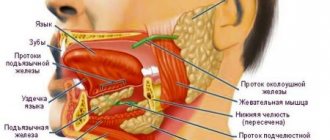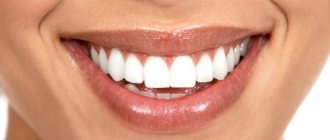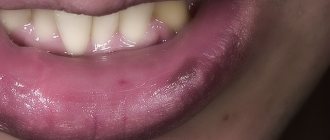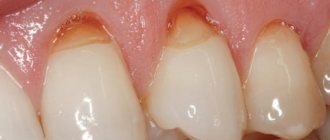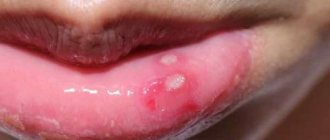Cheilitis is an isolated inflammatory process in the area of the mucous membrane, skin and red border of the lips. Outwardly it looks like swelling with redness and peeling of tissue. It can be an independent disease or a symptomatic manifestation of other pathologies. Sooner or later, almost every person encounters it, but at a young age the disease is noticeably milder, recurs less often and has no complications. In older people, due to a weakened immune system, periodic relapses of cheilitis can cause malignant tissue degeneration.
Causes
Cheilitis is a polymorphic and multifactorial disease that can be triggered by infections, physical and chemical environmental factors, as well as internal characteristics of the body. Among them:
- constant exposure to the open air - inflammation and peeling of the lips occurs when chapped by hot or cold air, excessive insolation;
- the presence of chronic diseases with skin manifestations of symptoms - various types of dermatitis, psoriasis, lupus erythematosus, lichen planus, syphilis, etc.;
- allergic reactions of the body - mainly with food allergies;
- tissue irritation from regular exposure to chemicals, including medications (for example, nasal drops);
- various neurological disorders, severe stressful situations, depression, constant anxiety;
- endocrine abnormalities - primarily hyperfunction of the thyroid gland, diabetes mellitus.
Main causes of the problem
If your lips are peeling, it is important to find out the reasons for this condition. This will affect the further outcome of treatment. The key reasons for peeling skin on the mucous membrane of the upper or lower lip in children and adults are:
- Avitaminosis. This reason most often affects the peeling of the mucous membrane in winter and spring.
- Development of an allergic reaction.
- Infectious processes in the oral cavity.
- Unfavorable climatic conditions. If the mucous membrane in the oral cavity peels off, the cause of this problem may lie in the effects of wind and cold air on the sensitive epidermis in the lip area. This factor also includes increased water hardness, which negatively affects the condition of the mucous membrane in children and adults.
- Diseases of internal organs. Such ailments include: diabetes mellitus, pathological processes in the oral cavity, herpes.
- Bad habits - smoking, constant licking of lips, excessive coffee consumption.
- Dehydration of the body. Sometimes the mucous membrane may suffer from a lack of fluid in the body.
Before carrying out any treatment, it is important to find out why the problem appeared, and then improve the appearance of the lips with the help of certain measures.
Types of cheilitis
Manifestations of cheilitis may vary depending on the type and cause of the disease. There are:
- Exfoliative cheilitis - manifested by peeling of the red border of the lips, with rare areas of burning and dryness of the lips themselves.
- Exudative cheilitis - symptoms of the disease are supplemented by swelling and severe pain. The skin in inflamed areas may become covered with baked crusts, which greatly complicate the patient’s life.
- The glandular form affects the minor salivary glands. Their congenital or acquired proliferation is observed, followed by infection with bacteria. In this case, the source of infection can be caries, periodontitis or banal plaque. Outwardly it manifests itself as the formation of cracks on the surface of the lips, which begin to become wet over time.
- The allergic form occurs under the influence of household, cosmetic or food irritants (often this is lipstick). There are characteristic manifestations of allergic cheilitis in musicians who play wind instruments and in those who like to chew pencils. This type of inflammation is characterized by severe swelling, often with the formation of blisters, as well as itching, severe redness and burning.
- Meteorological cheilitis develops under the influence of weather conditions (wind, sun) and is manifested by burning, itching with small weeping blisters, in place of which erosions and ulcers form over time.
- The atopic form manifests itself as a symptom of dermatitis or neurodermatitis. Manifests itself in the form of redness and ulcers in the corners of the lips.
- The hypovitaminosis type of the disease is formed in response to a severe lack of vitamins, mainly vitamins A, C, B2. A characteristic burning sensation affects the surface of the lips, mouth and tongue. The mucous tissues take on a swollen appearance, cracks on the lips peel and bleed.
- Macrocheilitis is a response to damage to adjacent nerves (facial nerve neuritis), while itching and swelling from the tongue can spread to other parts of the face.
Attention! With a long course, there is a high probability of inflammation degenerating into a malignant neoplasm. This is especially typical for the meteorological form, which, in the absence of proper treatment, is often complicated by precancerous diseases.
What to do
What to do if there is peeling or peeling of the mucous membrane on the inside of the lips? It is necessary to treat such a problem, depending on the cause that caused it. If the provoking factor is a deficiency of vitamin substances, it is recommended to undergo a course of treatment with multivitamin preparations (in particular, vitamin A and C play an important role). It is better for such medications to be prescribed by a doctor, since an excess of vitamin substances is no less harmful to the body than its deficiency.
If the cause is an allergy, it is important to identify the potential irritant. This could be a specific product, cosmetic, or drug. In this case, treatment consists of taking oral or topical antihistamines prescribed by a doctor. Additionally, it is very important to eliminate the allergen from the patient’s life.
In the presence of infectious processes, it is important to carry out timely and competent treatment prescribed by a specialist. If the problem arose under the influence of unfavorable climatic conditions, it is important to properly protect sensitive skin - before going outside, be sure to use a rich cream, hygienic lipstick or balm.
If there are diseases of internal organs, it is important to carry out their timely treatment. After which the unpleasant symptoms will go away on their own. If the mucous membrane suffers from dehydration, it is important to establish a drinking regime - drink at least one and a half liters of clean water during the day (this does not take into account liquid in teas, coffee or liquid dishes).
Diagnosis of cheilitis
There are no specific laboratory tests to detect cheilitis. All diagnosis of the disease is carried out by visual examination. To determine the causes of inflammation, diagnostics of the gastrointestinal tract may be prescribed for the presence of Crohn's disease or ulcerative colitis. Additionally, allergy tests are performed to exclude food allergies.
General laboratory tests allow you to check the condition of the body and determine the possible causes of cheilitis:
- low levels of vitamins due to hypovitaminosis can provoke exfoliative cheilitis;
- bacterial cultures of smears and biopsies are performed in patients with immune system disorders in the absence of results from the treatment;
- testing for markers of HIV infection, herpes, the presence of fungal or bacterial microflora, respectively, allows us to identify the viral, bacterial or fungal causative agent of cheilitis;
- a blood test for anemia, ESR are required to assess general health;
- examination of the function of the thyroid and pancreas for endocrine pathologies.
On a note! Cheilitis tends to be chronic with periodic relapses. Self-healing without medical supervision is almost impossible, so try to pay attention to such a “minor” problem and consult a specialist. Diagnosis of the disease is carried out by a general practitioner or attending dentist. In some cases, consultation with an allergist, infectious diseases specialist, dermatovenerologist or gastroenterologist may be required.
Treatment
Different forms of cheilitis differ in their approach to treatment. Collectively, the impact may include:
- correction of the psycho-emotional sphere - a neurologist prescribes sedatives, tranquilizers, a psychologist or psychotherapist conducts appropriate psychotherapy;
- physiotherapy - treatment with laser, ultrasound, magnetotherapy, electrophoresis is prescribed locally; they relieve irritation and accelerate tissue regeneration;
- drug symptomatic therapy - non-hormonal anti-inflammatory drugs are prescribed; in case of severe inflammation - hormonal drugs;
- immunotherapy – strengthen the immune system by taking immunomodulators and immunostimulants;
- vitamin therapy - taking vitamins A, C, group B (mainly vitamin B2) is of great importance;
- surgical treatment – typical for glandular cheilitis with enlargement of the salivary glands; Both laser ablation with a surgical laser and direct removal of areas of the gland are used;
- antiallergic therapy with antihistamines.
Additionally, the doctor may prescribe diet therapy with the exclusion of foods that provoke allergies or chemical irritation of tissues (spicy foods, saltiness and marinades). When staying outdoors for a long time, it is imperative to use special protective equipment.
Prevention
The main prevention of cheilitis is maintaining a healthy lifestyle and timely treatment of any infectious and allergic diseases. Basic list of measures:
- Eat right - a balanced menu should contain an abundance of fruits, vegetables, herbs, nuts, fish, and high-quality dairy products.
- Reduce the use of cosmetics - try to choose hypoallergenic formulations and constantly monitor the skin's reaction.
- Dose your exposure to open wind or direct sunlight.
- Protect your lip skin from physical and chemical damage.
- Take vitamin and mineral complexes periodically in courses (after consultation with your doctor).
- Give up bad habits.
- Seek medical advice promptly if you have characteristic symptoms.
Remember: your health is the greatest value, and constant monitoring of its condition is very important to maintain the body’s performance, especially in old age.
Lips peel from the inside
This problem is much less common than detachment of the upper part of the epidermis on the outside of the lips. However, it also brings severe discomfort and requires close attention. The skin in the mouth may peel due to:
- Allergic reactions (to new toothpaste, medications, food).
- Dental ailments (tartar, periodontal disease, gingivitis, caries, etc.).
- Previous burns (thermal or chemical).
- Serious diseases (autoimmune diseases, cancer, infections). With oncology, some area of disturbance may appear in the mouth, which bothers the person constantly (it does not hurt much, but does not heal). And infectious and autoimmune diseases usually manifest themselves as serious health problems, pain, large ulcers and other symptoms that are difficult to ignore.
The sudden appearance of skin peeling in the mouth is a reason to quickly consult a doctor. This is a rather atypical symptom that should not be ignored.


